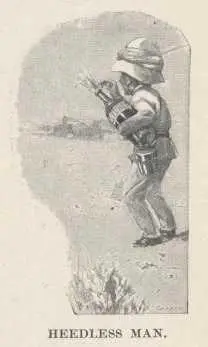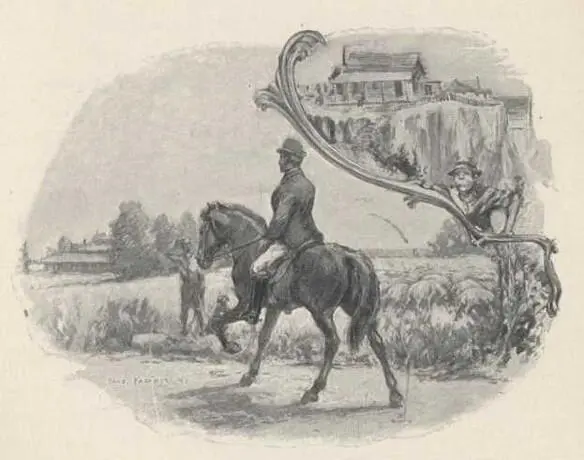Mark Twain - Following the Equator
Здесь есть возможность читать онлайн «Mark Twain - Following the Equator» весь текст электронной книги совершенно бесплатно (целиком полную версию без сокращений). В некоторых случаях можно слушать аудио, скачать через торрент в формате fb2 и присутствует краткое содержание. Год выпуска: 2004, Жанр: Классическая проза, Юмористическая проза, на английском языке. Описание произведения, (предисловие) а так же отзывы посетителей доступны на портале библиотеки ЛибКат.
- Название:Following the Equator
- Автор:
- Жанр:
- Год:2004
- ISBN:нет данных
- Рейтинг книги:3 / 5. Голосов: 1
-
Избранное:Добавить в избранное
- Отзывы:
-
Ваша оценка:
- 60
- 1
- 2
- 3
- 4
- 5
Following the Equator: краткое содержание, описание и аннотация
Предлагаем к чтению аннотацию, описание, краткое содержание или предисловие (зависит от того, что написал сам автор книги «Following the Equator»). Если вы не нашли необходимую информацию о книге — напишите в комментариях, мы постараемся отыскать её.
Following the Equator — читать онлайн бесплатно полную книгу (весь текст) целиком
Ниже представлен текст книги, разбитый по страницам. Система сохранения места последней прочитанной страницы, позволяет с удобством читать онлайн бесплатно книгу «Following the Equator», без необходимости каждый раз заново искать на чём Вы остановились. Поставьте закладку, и сможете в любой момент перейти на страницу, на которой закончили чтение.
Интервал:
Закладка:
—Pudd'nhead Wilson's New Calendar.
Hospitality of English-speaking People—Writers and their Gratitude—Mr. Gane and the Panegyrics—Population of Sydney An English City with American Trimming—"Squatters"—Palaces and Sheep Kingdoms—Wool and Mutton—Australians and Americans—Costermonger Pronunciation—England is "Home"—Table Talk—English and Colonial Audiences
All English-speaking colonies are made up of lavishly hospitable people, and New South Wales and its capital are like the rest in this. The English-speaking colony of the United States of America is always called lavishly hospitable by the English traveler. As to the other English-speaking colonies throughout the world from Canada all around, I know by experience that the description fits them. I will not go more particularly into this matter, for I find that when writers try to distribute their gratitude here and there and yonder by detail they run across difficulties and do some ungraceful stumbling.
Mr. Gape ("New South Wales and Victoria in 1885 "), tried to distribute his gratitude, and was not lucky:
"The inhabitants of Sydney are renowned for their hospitality. The treatment which we experienced at the hands of this generous-hearted people will help more than anything else to make us recollect with pleasure our stay amongst them. In the character of hosts and hostesses they excel. The 'new chum' needs only the acquaintanceship of one of their number, and he becomes at once the happy recipient of numerous complimentary invitations and thoughtful kindnesses. Of the towns it has been our good fortune to visit, none have portrayed home so faithfully as Sydney."
Nobody could say it finer than that. If he had put in his cork then, and stayed away from Dubbo——but no; heedless man, he pulled it again. Pulled it when he was away along in his book, and his memory of what he had said about Sydney had grown dim:

"We cannot quit the promising town of Dubbo without testifying, in warm praise, to the kind-hearted and hospitable usages of its inhabitants. Sydney, though well deserving the character it bears of its kindly treatment of strangers, possesses a little formality and reserve. In Dubbo, on the contrary, though the same congenial manners prevail, there is a pleasing degree of respectful familiarity which gives the town a homely comfort not often met with elsewhere. In laying on one side our pen we feel contented in having been able, though so late in this work, to bestow a panegyric, however unpretentious, on a town which, though possessing no picturesque natural surroundings, nor interesting architectural productions, has yet a body of citizens whose hearts cannot but obtain for their town a reputation for benevolence and kind-heartedness."
I wonder what soured him on Sydney. It seems strange that a pleasing degree of three or four fingers of respectful familiarity should fill a man up and give him the panegyrics so bad. For he has them, the worst way—any one can see that. A man who is perfectly at himself does not throw cold detraction at people's architectural productions and picturesque surroundings, and let on that what he prefers is a Dubbonese dust-storm and a pleasing degree of respectful familiarity. No, these are old, old symptoms; and when they appear we know that the man has got the panegyrics.
Sydney has a population of 400,000. When a stranger from America steps ashore there, the first thing that strikes him is that the place is eight or nine times as large as he was expecting it to be; and the next thing that strikes him is that it is an English city with American trimmings. Later on, in Melbourne, he will find the American trimmings still more in evidence; there, even the architecture will often suggest America; a photograph of its stateliest business street might be passed upon him for a picture of the finest street in a large American city. I was told that the most of the fine residences were the city residences of squatters. The name seemed out of focus somehow. When the explanation came, it offered a new instance of the curious changes which words, as well as animals, undergo through change of habitat and climate. With us, when you speak of a squatter you are always supposed to be speaking of a poor man, but in Australia when you speak of a squatter you are supposed to be speaking of a millionaire; in America the word indicates the possessor of a few acres and a doubtful title, in Australia it indicates a man whose landfront is as long as a railroad, and whose title has been perfected in one way or another; in America the word indicates a man who owns a dozen head of live stock, in Australia a man who owns anywhere from fifty thousand up to half a million head; in America the word indicates a man who is obscure and not important, in Australia a man who is prominent and of the first importance; in America you take off your hat to no squatter, in Australia you do; in America if your uncle is a squatter you keep it dark, in Australia you advertise it; in America if your friend is a squatter nothing comes of it, but with a squatter for your friend in Australia you may sup with kings if there are any around.

In Australia it takes about two acres and a half of pastureland (some people say twice as many), to support a sheep; and when the squatter has half a million sheep his private domain is about as large as Rhode Island, to speak in general terms. His annual wool crop may be worth a quarter or a half million dollars.
He will live in a palace in Melbourne or Sydney or some other of the large cities, and make occasional trips to his sheep-kingdom several hundred miles away in the great plains to look after his battalions of riders and shepherds and other hands. He has a commodious dwelling out there, and if he approve of you he will invite you to spend a week in it, and will make you at home and comfortable, and let you see the great industry in all its details, and feed you and slake you and smoke you with the best that money can buy.
On at least one of these vast estates there is a considerable town, with all the various businesses and occupations that go to make an important town; and the town and the land it stands upon are the property of the squatters. I have seen that town, and it is not unlikely that there are other squatter-owned towns in Australia.
Australia supplies the world not only with fine wool, but with mutton also. The modern invention of cold storage and its application in ships has created this great trade. In Sydney I visited a huge establishment where they kill and clean and solidly freeze a thousand sheep a day, for shipment to England.
The Australians did not seem to me to differ noticeably from Americans, either in dress, carriage, ways, pronunciation, inflections, or general appearance. There were fleeting and subtle suggestions of their English origin, but these were not pronounced enough, as a rule, to catch one's attention. The people have easy and cordial manners from the beginning—from the moment that the introduction is completed. This is American. To put it in another way, it is English friendliness with the English shyness and self-consciousness left out.
Now and then—but this is rare—one hears such words as piper for paper, lydy for lady, and tyble for table fall from lips whence one would not expect such pronunciations to come. There is a superstition prevalent in Sydney that this pronunciation is an Australianism, but people who have been "home"—as the native reverently and lovingly calls England—know better. It is "costermonger." All over Australasia this pronunciation is nearly as common among servants as it is in London among the uneducated and the partially educated of all sorts and conditions of people. That mislaid 'y' is rather striking when a person gets enough of it into a short sentence to enable it to show up. In the hotel in Sydney the chambermaid said, one morning:
Читать дальшеИнтервал:
Закладка:
Похожие книги на «Following the Equator»
Представляем Вашему вниманию похожие книги на «Following the Equator» списком для выбора. Мы отобрали схожую по названию и смыслу литературу в надежде предоставить читателям больше вариантов отыскать новые, интересные, ещё непрочитанные произведения.
Обсуждение, отзывы о книге «Following the Equator» и просто собственные мнения читателей. Оставьте ваши комментарии, напишите, что Вы думаете о произведении, его смысле или главных героях. Укажите что конкретно понравилось, а что нет, и почему Вы так считаете.











